Current state and challenges in teaching ukrainian online to non-philological foreign students
Abstract
The proposed article addresses the issue of enhancing the quality of education for foreign students of philology enrolled in Ukrainian higher education institutions in alignment with the requirements of international students and the Ukrainian educational system.
The article points out that the education of foreign citizens in non-linguistic higher education institutions can now be equated with intensive courses.
This complicates the language training of foreign communicators. That is why new methods, forms, tools and techniques are being searched for, which will be the key to achieving high results in teaching foreigners online.
In the modern information environment of online learning and during the difficult socio-political situation in our country, the way teachers impart relevant knowledge and skills and the way students acquire this knowledge are changing. This fact is reflected in the reduction of classroom hours and the increase of independent work time for foreign non-native speakers. It is clear that the established methods and forms of teaching need to be rethought and new solutions found.
In the case of oral learning, as in the case of oral teaching, foreign communicators learn grammatical material, vocabulary (learning the sound form, grammar, meaning and use of a word) and favourable conditions are created for increasing their knowledge of the target language, developing pronunciation, vocabulary, grammar, speaking skills and, above all, listening (the most difficult type of language activity for foreigners) as well as speaking.
The article outlines the main requirements of online language training with a limited number of hours in the learning process, as well as the advantages and challenges of oral learning.
The authors focus on oral teaching as the leading form of proactive learning.
Downloads
References
Didenko, I., Zagorujko, L., Filatova, O. (2021). Problems of teaching foreign languages to students of non-linguistic specialties: before, during and after the pandemic. Pedagogical sciences: theory, history, innovative technologies. 3 (107), pp. 501-510. DOI: https://doi.org/10.24139/2312-5993/2021.03/501-510 [in Ukrainian].
Zozulya, I.Ye., Pozdran, Yu.V., Slobodyanyuk, A.A. (2020). The role of distance learning of Ukrainian as a foreign. Scientific notes of V.I. Vernadsky Taurida National University. Series: Philology. Social communications. Vol. 31 (70), 1 Ch. 1, pp. 33-38. DOI: https://doi.org/10.32838/2663-6069/2020.1-1/07 [in Ukrainian].
Fomenko, T.M. (2021). Innovative approaches to teaching Ukrainian as a foreign language in distance learning. V International Scientific and Practical Internet Conference “Foreign Language in Professional Training of Specialists: Problems and Strategies”. Kropyvnytskyi, pp. 167-169 [in Ukrainian].
Shhepanska, H. (2023). Information Technologies at the Classes of Ukrainian as a Foreign Language in the Conditions of Distance Education. Theory and Practice of Teaching Ukrainian as a Foreign Language. 17, pp. 50-57. DOI: http://dx.doi.org/10.30970/ufl.2023.17.3910 [in Ukrainian].
Hermanovych, H. (2023). Learning the ukrainian language by foreign medical students. Theory and Practice of Teaching Ukrainian as a Foreign Language. 17, pp. 73-82. DOI: http://dx.doi.org/10.30970/ufl.2023.17.3912

